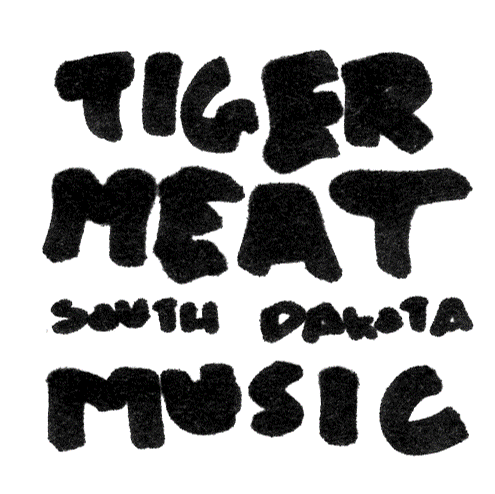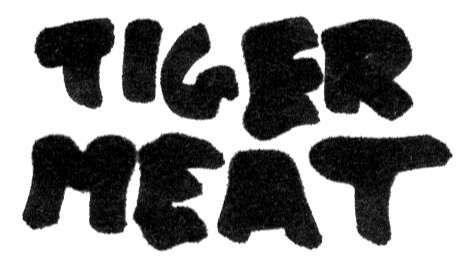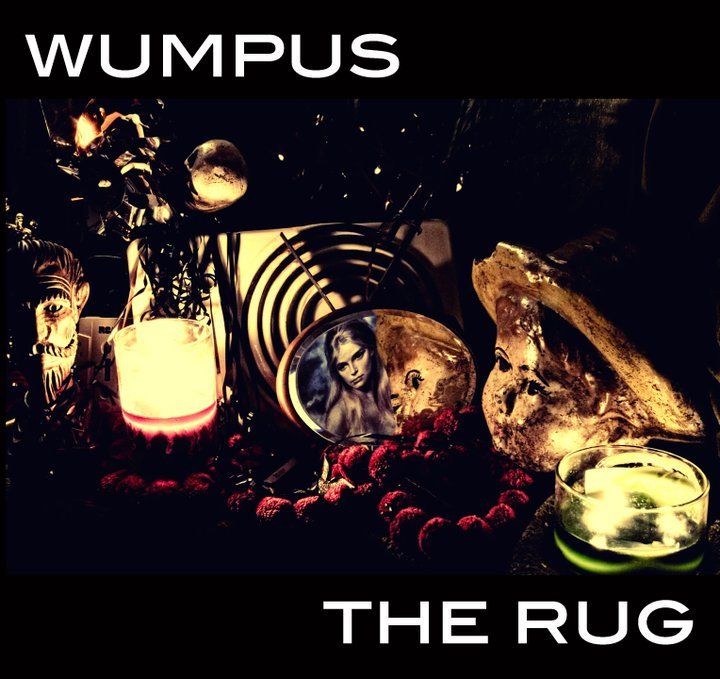Russ Stedman
A Theory of Syria (1987)
This Is Normal (2022)
Rock, Experimental
— track 3: “Animals”
Russ Stedman: I guess you can call it revisionist history [laughs]. That's basically what it is. There were some songs I wanted to get rid of, that I didn't feel like having available anymore. And there were some things that I didn't think were really worth having up there [on Bandcamp]. This was stuff that was released anywhere from 1987 through 2000. I did a lot of recording during those years, and I put out a lot of tapes, and then CDs when CDs came along. I took all of that old stuff, got rid of the songs that I didn't like, and made new albums. Because to look at my old Bandcamp page, there was like 40 or 50 albums there — for anybody that thought they were going to check it out. It's like, "What am I supposed to start with?" And then if you just, like, click your mouse in the middle of the page and start with one, you might end up with one that is just horrible and then you give up, you know? [laughs] Yeah, that's pretty much it. I was kind of just carving the fat. [The reorganized albums] are by time periods. The first four of them all represent a year. It's like '87 [A Theory of Syria], '88 [Tie Vote Algebra], '89 [Icebox Dopey Fourteen], and '90 [Get Me The Hell Out Of Here]. Those are all like the “best of” that year. And then everything from there is original. There's one album called Here's Your Change. And then Bloated and Pretentious. And Run Down To The Butcher Shop And Buy Me A Rose.
The History of a Year and Other Assorted Songs, I kind of consider that the first solo album. It's too bad that I ended up taking it off of my Bandcamp because the main focus of my interview [with Tobi Vail from the band Bikini Kill] was that album, and here I took it down and replaced it with something different. They took that interview down, probably because the links to the music don't work anymore. But yeah, that was really cool. I was sitting right here one night, and I got this message like, "Hey, my name is Tobi Vail and I was wondering if you'd be interested in being interviewed for this new thing that I'm writing for Bandcamp." Right away I was like, "Oh, bullshit. This isn't Tobi Vail. Somebody's fucking with me." So I actually went to some other platform and said, "Hey, is this really Tobi Vail? Because someone's getting a hold of me claiming that they're Tobi Vail and they want to interview me." And she's like, "Yeah, this is me." Story was, her sister used to work at this label called Kill Rock Stars which was somewhere in the Pacific Northwest back in the 80s, and I used to just send my tapes to record labels unsolicited. For some reason her sister just really latched on to that tape and used to listen to it all the time. Tobi told me this whole story about how back in the 80s her sister said, "Yeah, there's some weird guy that lives in South Dakota that sends us tapes all the time. And this one's really good!" So when Tobi started doing this thing for Bandcamp, for some reason she thought about it. She was like, "I wonder if I could find that." And then she found it. It's so great. That's probably my biggest claim to fame, being interviewed by Tobi Vail. Now I screwed it up and it's gone forever [laughs].
//\\//\\//
I’ve recorded about 100 releases in the last 30 years. Mostly because half of that time was spent living in a very small, boring town [Mitchell, SD] and I needed to entertain myself. [When] I was probably 5 or 6 years old, this was the mid-70’s, my dad had a home stereo with an 8-track player. He would bring me home occasional 45’s. “Convoy” and the “Theme from S.W.A.T.” were two of my favorites. Then the neighborhood kids introduced me to KISS. I bought Rock and Roll Over when it came out. I spent the next couple of years listening to KISS as if they were the only band that existed. When you’re 7, what’s better than a band that breathes fire, spits blood, smashes stuff, and look like monsters? When it came that time around 3rd grade or so when they start having kids join school band, I went to the sign-up session. My original intention was to be a drummer, but of course everyone wanted to be a drummer, and they told me I had to pick something else. I settled on alto sax, because my favorite TV show was Happy Days and Ritchie Cunningham played sax. I never practiced or learned how to play it and gave up on it completely pretty quickly.
I took [guitar] lessons long enough to realize that after I knew how to play a power chord, that was good enough for me at the moment. My friend, Mike Myers, started playing drums, and we started writing and recording almost immediately. We didn’t have any inclination to learn other people’s songs, probably because I was too new at it to figure any songs out by ear. I knew how to play power chords and he knew how to play a 4/4 beat, so we became a 13-year-old studio band called Minor 2049er, named after a popular video game. A few years later, I met Evan Peta, and he taught me the importance of the blues in rock soloing and explained major modes to me. The first band I was in that played in front of people was called Stainless Steel — very metal. We were kind of manufactured by the local music store. Mike and I had gotten to the point where we were starting to get good enough to learn how to play hackneyed versions of KISS, Quiet Riot, Billy Idol, ZZ Top, et al. We asked the people at the music store to find us a bass player and they did. Stainless Steel lasted for a couple of years, and all the while I was recording my secret originals. In 1985, I started discovering punk rock, thanks to Never Mind the Bullocks and the Repo Man soundtrack. By 1986, I began releasing tapes under the fake band name Teenage Slots, [that] lasted for a couple years. By then I was fully into releasing tapes, and briefly went by the name RBS before dropping the band ruse altogether and just started putting my real name on stuff. 1982-1987 was ping-pong recording. Usually recording myself playing a guitar part along with a Matel Synsonic drum machine (ordered out of the Sears catalog), then playing that tape through a little mixer and overdubbing other parts onto a second tape deck. [In 1985 I was in a cover band called] XTD. I made quite a bit of money playing in this band, which allowed me to buy a 4-track.
I suppose I first became aware of the concept of people releasing home-produced music on cassette and considering them to be “releases” from reading Maximum Rock And Roll magazine. What I mean by that is, I had been writing and recording my own music for about 4 years, but would have never thought that there were people out there doing the same thing and then taking it a step further and creating album titles, artwork, and multiple copies of their recordings. Before that, this was something I just did for my own amusement in secret. I would have been horrified if anyone at school would have found out. Generally no one ever heard my tapes other than myself and one friend (drummer Mike Myers) who participated in my earliest recordings. It wasn’t until finding out about punk rock and then later encouragement from additional friends that I released a real tape. Over the next year or so, I sent a number of tapes to Maximum Rock And Roll hoping to be reviewed. I’m guessing my tapes were ignored either because they were coming from an address in South Dakota, or that they weren’t punk enough, or maybe they just sucked. Either way, being ignored by Maximum Rock And Roll pushed me to look for other avenues, like Sound Choice and Option, who also pretty much ignored me [laughs].
It was '94 when I first moved to Sioux Falls. [Mike Myers] was going to school at USD, we started a band together [called Ten Center], and it was all my stuff. We played The Pomp Room when it was open and stuff like that. That lasted about a year, and that's really the only time I've ever had a band together that did almost exclusively my music. We played a ton of shows, but no one ever liked us or came to see us because we weren’t alt-country. There was quite an active local music scene here in the mid-90’s, but a lot of it was of the Wilco/Uncle Tupelo country-rock vein, and we quickly found that no one was interested in a band that played weird, loud, distorted originals and Butthole Surfers covers. It was a real let-down in that respect, but still the best band I was ever in. After that, there was a whole line of bands where I played lead or rhythm guitar. I joined The Sneakies to replace someone. It had originally started out as a pop-punk band, but by the time I got there it had morphed into a tough-guy rock and roll band a la Johnny Thunders. After The Sneakies broke up, the drummer and I stuck together and got a new bass player. [Stickler was] similar to The Sneakies, with some Weezer influence thrown in. Biggest accomplishment was opening for Mike Watt. Then I quit for a while. And then [in 2006] I joined Moist Host also to replace someone. Weirdo punk, a very original style. I enjoyed the practices more than the gigs, except the time we opened for Neil Hamburger. It was a ton of fun, but then we lost our awesome practice space and slowly melted away. There were a couple of other bands I was in, like Pale Norse and the Narwhals [now Pale Norse and the Local Support], and then Velcro Ultrasound. I think Velcro Ultrasound is pretty much done. We had this side project called The Soft Opening, Erik [Ritter] was actually in that with us, he was the lead singer. But it was just a side project. Like, we didn't have any songs and we didn't practice, we just went to gigs and played whatever came out of us at that moment, it was all completely improvisational. All of those bands during that stretch, those were all existing bands I joined after the fact. I don't think I'm gonna be playing live anytime soon, but who knows? The last couple of bands I was in, I didn't have any idea I was going to be in them until somebody asked me to be in them, so I guess that's how it works [laughs].
Right now I own three amps. I actually just put one of them up on Reverb a couple of days ago. When you're not playing out, you don't need three amps. I'd rather have some money for that than just have it sitting in the closet. A couple years ago, I started messing around with building guitar pedals. And I'm glad I did because it was probably mid-'19 when I started doing it, and then when the pandemic came I started working from home. So there was a very long time, where all I did was sleep, work, and build guitar pedals. I mean, that was kind of what kept me going during the pandemic, was learning how to do that stuff. So it came along at a perfect time. There's a number of places online that sell the circuit boards for different pedals, so I go and buy a circuit board for what I want to build, and then I had to build up this huge library of parts. Now I'm kind of slowing down on that a little bit, but I've still got enough parts to start a factory [laughs]. You know how it goes with that kind of stuff, you get all excited about something, and spend too much money on it, and then kind of slow down and you're left with the remains [laughs].
//\\//\\//
I'm in the process of mixing a new album right now, which I'm really excited about because I consider it the best thing I've done for, I don't know, 20 years or more. It's called This Is Normal. It feels like it could be a band album, because the songs kind of have the same vibe to them. I've been calling it "angry shoegaze," because there's tons of guitars on it, and the lyrics are all kind of angry and depressing stuff about feelings that have been dredged up over the pandemic. So it's the pandemic album. Maniac and Vine, those are the songs that I was recording during the pandemic. I mean, is it over yet? I don't know. Anyway [This Is Normal] was recorded between October of last year and February of this year, but the lyrics have been sitting for a while. There's one [album] called Here's Your Change that came out in '93. It's pretty much straight ahead rock all the way, it was kind of my reaction to what was going on in music at that time, which was grunge and stuff. It's not really a grunge album, but it is straight ahead power chord rock all the way through — whereas a lot of my stuff was like every song is a different genre of music [laughs]. So that one's really cohesive. And I think this new one, [This Is Normal] — bands always say this kind of stuff, but I think that this new one is probably the best thing I've done since Here’s Your Change. So, I mean, that’s going on 30 years ago.
The mixing process has been a long battle for me, but I've got a good rhythm going now. There's ten songs, and I've got six of them pretty much mixed. I really like this thing a lot, and I kind of want to make a CD out of it, but — it used to be like, "Does anybody have a cassette player anymore?" Because I started with tapes, you know? Nobody has a tape player anymore. Now we're to the point where it's like, "Does anybody even have a CD player anymore?" Most cars still have them, but they're making cars without CD players now, because you just Bluetooth your phone in and listen to your music. So yeah, I kind of want to make a physical object out of it. And I even bought a photo from [Sioux Falls photographer] Merecedes Nelson [aka Film Fawn] to use for the cover for this. So it's kinda like, “Well, I did that too, so it would be kind of silly to just make this online only when I paid money for this artwork.” I think I'm probably just gonna do a CD anyway, even though they're kind of passé at this point. But I mean, there's nowhere else to go other than vinyl, and that's too expensive. But, you know, I've been doing this most of my life and I've always lost money doing it. I wasn't doing it for money, I was doing it because I wanted to do it.
RUSS STEDMAN’S ESSENTIAL SOUTH DAKOTA ALBUMS
No Direction — No Direction (1983)
State Birds — Polish Up Your Gilmour (1991)
Love, Calvin — Mr. Joy (1990)
Wumpus — The Rug (2010)
Moist Host — Moist Host (2004)
Androgynous Squash — Androgynous Squash (2015)
Gordo Jibang — Gordo Jibang (2016)
SOURCES
Campau, Don. “Interviews: Russ Stedman.” The Living Archive of Underground Music, 31 Oct. 2011, http://livingarchive.doncampau.com/interviews/russ-stedman.
Mitchell, Brian John. “QRD Interview with Russ Stedman.” Silber Media, QRD Zine, July 2010, http://www.silbermedia.com/qrd/archives/42RussStedman.html.
Stedman, Russ. Interview. By Jon Bakken. 5 May 2022.
Stewart, Ian C. “Interview: Russ Stedman Epic.” AUTOreverse Independent Music Magazine Review, 18 July 2011, https://autoreversetoinfinity.wordpress.com/2011/07/18/interview-russ-stedman-epic/.











